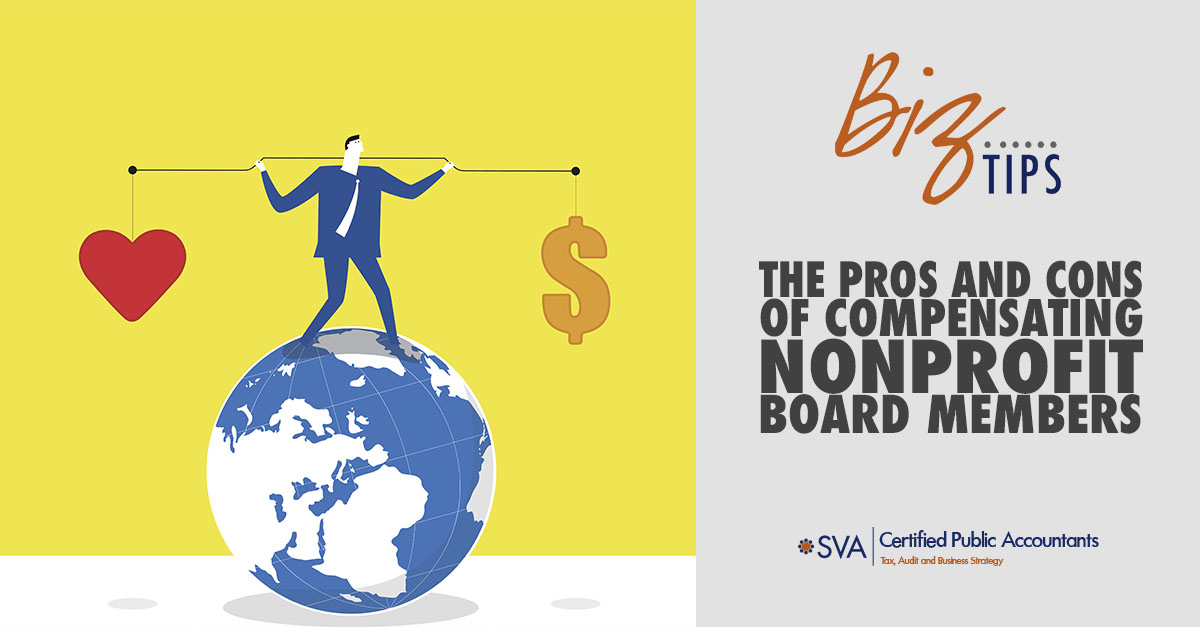As a nonprofit director, you may occasionally wonder whether it is beneficial to offer compensation to your board members.
Most often, nonprofits that can afford to pay their board members are larger, multifaceted organizations, such as art institutions, national foundations, or healthcare systems.
For smaller organizations, the leaders are volunteers who typically have full-time professions and serve the organization to benefit the public, not their own private interests.
However, nonprofits place significant responsibilities on their board members, who are regularly tasked with fiduciary and organizational work to ensure the organization is carrying out its mission. As a result, board members are often seen as visionary leaders, overseeing the nonprofit’s policies, strategic plan, and fundraising efforts, all while maintaining a volunteer status.
Before weighing the pros and cons of paying your board members, it is important to first consider the federal laws that affect nonprofit compensation.
(Download Video Transcript)
Compliance with Federal Laws and Regulations
The first law to take into consideration is the Volunteer Protection Act of 1997 (42 U.S.C. §14501 et seq.), which encourages individual volunteerism. The act defines the term “volunteer” as “an individual performing services for a nonprofit organization or a governmental entity who does not receive a) compensation (other than reasonable reimbursement or allowance for expenses actually incurred); or b) any other thing of value in lieu of compensation, in excess of $500 per year.”
Next, rules associated with Form 990, or the Return of Organization Exempt from Income Tax, require extensive reporting. This form calls for accurate and thorough information related to an organization’s compensation agreements, along with potential conflicts of interest that may arise.
Third, the amount of board member compensation that organizations can provide is directly related to the private inurement and excess-benefits regulation of the Internal Revenue Code (IRC). According to IRC Section 501(c)(6), any net earnings that benefit an individual are prohibited. Section 501(c)(3) also bars board members and directors from profiting from their positions at a nonprofit organization under the policy of excess benefits.
Aside from these rules and possible state laws, payment for certain services may be legal, but it is important to adhere to the recognized market average when compensating board members. Paying in excess of the average could result in serious penalties, such as excise taxes, hefty fines, or even the loss of your organization’s tax-exempt status.
Weighing the Pros and Cons
After carefully reviewing and interpreting the federal and state laws associated with paying board members, nonprofit leaders should develop a formal policy for compensation that aligns with similar organizations. The policy should define which members are eligible for payment, how the compensation will be structured and why compensating members is beneficial to the nonprofit.
As you consider your compensation policy, consider the following advantages and disadvantages.
Pros:
- Promotes professionalism and extends the opportunity to serve the nonprofit to highly qualified leaders
- Instigates better attendance at board, committee, and staff meetings
- Holds board members accountable for their success and performance
- Tangibly awards individuals for giving their personal time and effort to further the organization’s mission
- Encourages economic diversity, granting individuals an opportunity to serve the nonprofit who may not otherwise have been able to do so
Cons:
- Board members no longer seen as volunteers, and payment could discourage volunteering
- Donors and organization members expect their donations to be used within programs and to deliver services, not to pay board members
- Nonprofits may lose the protective status offered in the Volunteer Protection Act
- May make it difficult to separate these members from paid nonprofit staff
- The board’s fiduciary responsibility of administering the nonprofit’s funds may be called into question
The decision to approve a policy to compensate board members should ultimately be a collective resolution that reflects your nonprofit’s culture, vision, and expectations of key supporters.
After ensuring the compensation policy complies with federal and state law, nonprofits can decide if it makes sense for them to reward board members for their commitment of time and effort.
© CPAContentPlus 2019

